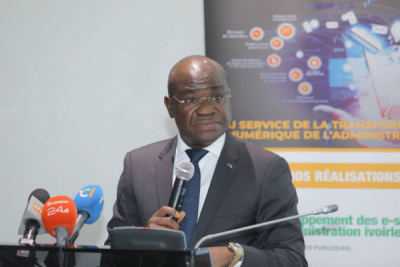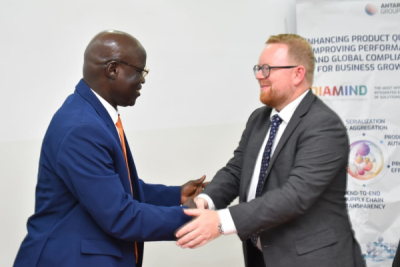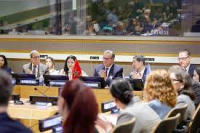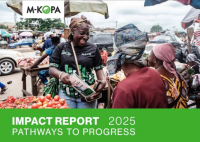• Paga Group launched Doroki, an all-in-one business suite helping Nigerian SMEs manage sales, payments, and customer relations.
• The Android-only app works offline, synchronizing data when Internet connectivity resumes, and has over 1,000 downloads on Play Store.
• Doroki targets small firms that still operate manually, aiming to boost efficiency, traceability, and competitiveness
Paga Group Ltd, a Nigerian fintech founded in 2009 by Tayo Oviosu, developed Doroki as a digital solution to help businesses modernize operations. The company said the platform acts as an all-in-one suite for shops, restaurants, salons, grocery stores, and other SMEs to manage daily activities.
Doroki provides stock management, invoicing, and payment processing through cards, USSD, QR codes, bank transfers, and Paga’s system. The app also supports customer relationship monitoring, promotions, real-time sales reporting, and cloud backups to prevent data loss.
The platform enables multi-branch management, staff role administration, and bulk data uploads via Excel or CSV for large catalogs. Paga said the app operates offline and synchronizes once Internet access returns, addressing connectivity gaps in Nigeria.
Doroki is currently available only on Android and has been downloaded more than 1,000 times on the Play Store. Paga said the mobile-first approach reflects the dominance of Android in Nigeria’s market.
Paga noted that many small businesses still operate without digital tools, often lacking visibility over sales, stock, and costs. Doroki seeks to centralize these functions, reduce errors, and improve customer service responsiveness.
The company said Doroki could improve efficiency and competitiveness of Nigerian micro and small businesses, particularly those looking to expand or enter more structured markets.
This article was initially published in French by Adoni Conrad Quenum
Adapted in English by Ange Jason Quenum
As talented young Africans struggle to get noticed, new digital initiatives are emerging to help highlight their skills. These solutions are transforming job access and redefining how talent connects with opportunity.
Tamba Emmanuel Millimono, a Guinean entrepreneur and coach, is the founder and CEO of Mansa Talents, a technology startup designed to centralize the showcasing and networking of young African talent. Millimono recently won second prize at the national stage of the 2025 Orange Social Venture Prize (OSVP) in Guinea.
Founded in 2024, Mansa Talents developed a talent management and recruitment platform that integrates Artificial Intelligence (AI)-based job search tools. Its mission is to certify and support the professional development of Africa's new generation through an intuitive digital space.
The startup offers companies a tool to publish job openings and collaboratively track received applications in an organized manner. The platform also provides a qualified talent database, enabling recruiters to directly identify candidates matching their specific needs. Companies can also showcase their employer brand to attract applicants.
Mansa Talents provides candidates a digital space to create a professional curriculum vitae using several customizable templates. The platform also offers training resources and an AI-powered matching system. Candidates can browse and apply directly to opportunities posted by partner companies.
Prior to the POESAM award, the startup was recognized in the "e-employment" category at the World Summit on the Information Society (WSIS) in Geneva, organized by the International Telecommunication Union (ITU).
Millimono is also a coach in public speaking and personal development. He graduated from the General Lansana Conté University of Sonfonia in Conakry in 2020 with a bachelor's degree in sociology, community development, and organization.
Melchior Koba
Digital solutions are emerging within Benin's digital ecosystem to meet the needs of the real estate sector. Guerin Agossadou is one of the entrepreneurs developing digital services tailored to local market realities.
Beninese data scientist and mobile application developer Guerin Agossadou is tackling local real estate challenges as the cofounder and CEO of Locapay, a startup dedicated to digitalizing and securing property services in Benin.
Founded in 2024 by Agossadou and Julian Adjibi, Locapay offers a digital solution designed to simplify, automate, and secure rent management and housing searches. The initiative addresses persistent difficulties for tenants, such as fraud, uncertainty about property quality, and payment constraints, as well as problems for landlords, including tedious follow-up, rent collection, and remote management. The startup operates via a mobile platform integrating various management tools.
The platform allows tenants to search for housing, conduct virtual tours, select validated listings, and pay rent via mobile money. Landlords receive a dashboard to register their properties, track payments, store documents, receive notifications, and manage all stages of the rental cycle remotely. Locapay provides them with a monitoring tool to limit late payments and improve investment management.
Locapay also includes ancillary services, allowing artisans and maintenance professionals to directly offer their services to tenants and landlords, facilitating connections for property upkeep and renovation.
Agossadou holds an engineering degree in mathematics and modeling from École Nationale Supérieure de Génie en Mathématique et Modélisation in Abomey, Benin. He is currently pursuing a Master's degree in data science with a specialization in insurance at the University of Évry Paris-Saclay in France.
Melchior Koba
- Côte d'Ivoire launches government data-sharing interoperability platform
- Estonian-developed UXP enables secure, real-time exchange across agencies
- Pilot covers 12 institutions, supporting 2030 "zero paper" ambition
Côte d'Ivoire's Minister of Digital Transition and Digitalization, Ibrahim Kalil Konaté, launched a public administration interoperability platform on Thursday, Sept. 25, in Abidjan. The tool is designed to enable the secure, real-time exchange of data between the information systems of various state entities.
According to the Minister, the platform is intended to break down the siloed operation of government agencies, which causes delays and increases costs for both the state and citizens. It is seen as a central lever for simplifying procedures, improving service quality, enhancing transparency, and supporting the Ivorian ambition to achieve "zero paper" by 2030.
The chosen solution, named UXP, was developed by Estonian company Cybernetica. The open-source and adaptable system allows information systems to communicate and securely exchange data in real-time. Practically, citizens will no longer need to provide the same documents multiple times to different administrations. Data recorded by one service can be automatically shared with another, with the user's consent.
The pilot phase involves 12 public institutions, including the Directorate General of Taxes, the National Office of Civil Status and Identification (ONECI), the National Social Security Fund (CNPS), and the Abidjan Commercial Court. The project is led by the National Computer Development Company (SNDI), as part of the digital roadmap adopted in 2022 with support from the Estonian firm Digital Nation.
The initiative is central to the Côte d’Ivoire 2030 Strategic Plan, which places digitalization at the core of modernization and inclusion efforts. Ultimately, the platform is expected to significantly reduce processing times for administrative procedures, limit costs related to administrative duplication, and strengthen user trust in public administration. However, it must address several challenges, including its adoption by all administrations, data security, and its gradual extension to all public structures.
Samira Njoya
- Guinea-Bissau launches national pharmaceutical traceability system with AVG
- Mandate requires full drug tracking; regulations effective March 2026
- Initiative targets counterfeits, strengthens healthcare and patient access
Guinea-Bissau last week enacted a national pharmaceutical traceability mandate, a regulatory system that requires the tracking and authentication of every medicine throughout the supply chain. Officially announced on Friday, Sept. 26, the initiative, undertaken in partnership with Italy's Antares Vision Group (AVG), aims to secure patient access to treatments and modernize the management of the pharmaceutical sector.
"Pharmaceutical safety and transparency are the foundation of a modern healthcare system. With the National Drug Catalogue at the center of ARFAME’s oversight role, Guinea-Bissau is creating a model that ensures compliance, protects patients and provides sustainable access to medicines," said Gianluca Mazzantini, CEO of Antares Vision Group.
The system relies on several key tools, including the National Catalogue of Medicines, a centralized platform for all health product data. Beginning in October 2025, this will be supplemented by the AVGroupHub, a digital interface accessible to manufacturers, importers, distributors, and dispensers. This system will mandate product registration, complying with regulations set to take effect in March 2026, ensuring complete traceability and strengthening the fight against illegal distribution channels.
This initiative addresses Guinea-Bissau’s significant challenges in pharmaceutical regulation, which include parallel distribution circuits, a lack of centralized control, and an absence of reliable data on drug availability. It is part of the country’s National Digital Health Strategy, launched in January 2025, which aims to modernize data management, improve coordination between health facilities, and enhance the supervision of pharmaceutical supply chains.
Ultimately, the program is expected to boost sector transparency, combat counterfeiting, secure access to essential treatments for the population, and lay the groundwork for modern, sustainable digital healthcare in Guinea-Bissau.
Samira Njoya
Equipping youth with AI and robotics training prepares them for the 230 million digital skills–based jobs expected in Sub-Saharan Africa by 2030. It also ensures underserved groups, including girls, gain equal opportunities to participate in the digital economy and drive local innovation.
The International Telecommunication Union (ITU), Google, and musician-turned-tech entrepreneur will.i.am have unveiled a new programme designed to give young people across Africa hands-on training in artificial intelligence (AI) and robotics.
The initiative, launched during the Digital@UNGA Anchor Event at the UN General Assembly, held September 23, targets underserved communities, particularly in countries where the ITU-UNICEF Giga project is working to connect schools to the internet.
“This programme will unlock new opportunities for AI literacy among young people, empowering them to lead the digital transformation that is reshaping our societies,” said ITU Secretary-General Doreen Bogdan-Martin. “Our aim is to equip youth across Africa with the knowledge and tools they need to succeed in an AI-driven world.”
The effort tackles two major hurdles—connectivity and digital skills. While demand for AI expertise is soaring globally, ITU says 2.6 billion people remain offline, including 1.3 billion children. In Africa, six in ten young people are still without internet access, restricting their participation in the digital economy. For many students, this programme will mark their first opportunity to get online, learn coding, and experiment with robotics.
Through Giga-connected schools—UNICEF and ITU’s initiative to link every school to the Internet and give every young person access to information and opportunity—students aged 10 to 18 will be able to take AI courses offered under ITU’s AI Skills Coalition and the Robotics for Good Youth Challenge, part of its flagship AI for Good programme. The programme will also give special attention to girls and other groups underrepresented in STEM education.
Will.i.am, ITU’s AI Skills Coalition Goodwill Ambassador and founder of the i.am Angel Foundation, will help deliver robotics kits, localized curricula, and teacher training to schools. “In today’s tech-driven economy, it’s urgent to ensure young people in underserved regions gain STEM, robotics, and AI skills,” he said. “These skills are the key to helping them thrive and address the world’s toughest challenges.”
Google.org, the philanthropic arm of Google, is contributing USD 1 million alongside technical expertise. “We must democratize access to AI to ensure its benefits reach everyone, everywhere,” said James Manyika, Google’s Senior Vice President of Research, Labs, Technology & Society.
The rollout will begin in Ghana, Ivory Coast, Kenya, Nigeria, and South Africa, with activities including teacher training, distribution of robotics kits, localized course development, and national showcases. Over time, the programme is expected to expand across Africa and beyond, building on ITU’s Robotics for Good competitions in more than 60 countries and Giga’s partnerships in 45.
By 2030, up to 230 million jobs in Sub-Saharan Africa will require digital skills, according to the World Bank and IFC, underscoring the urgency of equipping the region’s youth with future-ready training. For many students, this will be the first opportunity to access the internet, code, and experiment with robotics.
By equipping millions of young Africans with future-ready skills, the initiative seeks to narrow the digital divide while fostering innovation ecosystems across the continent. Organizers say it could accelerate progress in fields ranging from education and entrepreneurship to healthcare and climate resilience.
Hikmatu Bilali
The Bill will make Ghana more attractive to investors, foster stronger collaboration between innovators and policymakers, and build an enabling environment where young entrepreneurs can grow and succeed.
The Ministry of Communication, Digital Technology, and Innovations is inviting the public to take part in nationwide validation workshops on the country’s Draft Innovation and Start-Up Bill, it announced on September 25.
Developed in collaboration with private sector actors, the legislation seeks to create a legal and regulatory framework to support research, startups, and innovation enterprises. The bill is designed to promote entrepreneurship, strengthen Ghana’s innovation ecosystem, and position innovation as a key driver of economic growth and job creation.
Workshops will bring together government agencies, academia, research institutions, technology hubs, private sector players, and civil society. Members of the public are also encouraged to participate and share feedback.
The consultations come at a time when Ghana’s tech and start-up sector is gaining momentum. According to the global startup research platform StartupBlink, Ghana is home to 136 startups, representing 12% of all startups in West Africa—approximately one startup for every 100,000 people. The ecosystem grew 14% in the past year, ranking 81st globally in the 2025 Global Startup Ecosystem Index, up seven spots from 2024. Ghana now holds the 3rd position in Western Africa, trailing Cape Verde and ahead of Senegal.
Over the past decade, Ghana has attracted more than US$535.5 million in startup investment, accounting for 4.67% of Western Africa’s total. Between 2023 and 2024, funding rose 7.85% even as deals dropped 40.91%, reflecting larger investments despite fewer transactions.
Ghana’s move mirrors trends across Africa, where countries are adopting laws to formalize and strengthen their startup ecosystems. Nigeria’s Startup Act 2022, for example, offers tax holidays, seed funding, and a certification system to ease regulatory processes and boost investment. In Kenya, for instance, a Startup Bill is under discussion that would require qualifying startups to allocate at least 15% of expenses to research and development while offering incentives such as tax breaks, grants, and incubation support. Such regional efforts signal a growing recognition of the role startups and innovation play in addressing youth unemployment, boosting competitiveness, and driving inclusive development.
By inviting broad input, Ghana aims to ensure its new law reflects the needs of innovators and entrepreneurs nationwide. Developing its own Startup Bill will position Ghana to attract investment, strengthen collaboration between innovators and policymakers, and create a supportive environment for young entrepreneurs to thrive.
Hikmatu Bilali
Morocco is positioning itself as a digital transformation leader, showing that countries in the Global South can set the pace in AI cooperation and sustainable development.
On September 26, on the sidelines of the 80th United Nations General Assembly (UNGA-80), the Kingdom of Morocco unveiled its new Digital for Sustainable Development (D4SD) Hub, a partnership with the United Nations Development Programme (UNDP). The Hub is designed to help countries in Africa and the Arab States harness digital public infrastructure, artificial intelligence (AI), and innovation to accelerate progress towards the Sustainable Development Goals (SDGs).
“The adoption of Artificial Intelligence has emerged as a decisive global issue, and Morocco is determined to play an active role by harnessing this technology in the service of inclusive and sustainable human development,” said HE Aziz Akhannouch, Head of Government of Morocco.
The D4SD Hub, backed by a US$38 million budget over three years, will serve as a collaborative platform to co-create, pilot, and scale inclusive digital solutions. It will apply AI tools to health, education, climate resilience, and governance while empowering women and youth as digital leaders. The initiative stems from a memorandum of understanding signed in July between Morocco and UNDP during the country’s National AI Conference, signaling early alignment on the country’s AI priorities.
“Digital transformation is a cornerstone of UNDP’s newly adopted 2026–2029 Strategic Plan—an essential accelerator of systemic change across all areas of development. We are committed to helping governments harness AI in ways that build trust, ensure transparency, and promote equity,” said Haoliang Xu, UNDP’s Acting Administrator. “Through the D4SD Hub, Morocco and UNDP are creating a platform for countries to co-design, test, and scale digital solutions that serve people and the planet.”
The launch brought together ministers, UN officials, private sector leaders, and civil society partners to deliberate on the creation of an AI and Data Science Alliance for Arab States and Africa, a platform to harmonize standards, boost talent development, and ensure the responsible use of AI.
Morocco’s new hub is part of a broader wave of digital initiatives across Africa. In Kenya, UNDP is helping establish a GreenTech Hub and AI Skills Centre at Konza Technopolis. Similarly, the International Telecommunication Union (ITU), Google, and innovator will.i.am recently unveiled an AI and robotics training programme for young people across the continent. Within Morocco itself, grassroots initiatives like AI4Morocco are nurturing local AI ecosystems through training and collaboration for startups.
The launch comes as Morocco deepens international partnerships to accelerate its AI strategy. Also on the sidelines of UNGA-80, the government held talks with U.S.-based OpenAI on research, innovation, and ecosystem development, following a recent cooperation deal with French startup Mistral AI. These partnerships align with Morocco’s “Digital Morocco 2030” strategy, which aims to make AI a pillar of national development by strengthening local skills, fostering startups, and ensuring ethical adoption.
The D4SD Hub aligns with the UN Secretary-General’s Roadmap for Digital Cooperation, UNDP’s Global Digital Strategy, and the digital agendas of both the African Union and Arab League.
Hikmatu Bilali
Affordable smartphones and pay-as-you-go models connect millions of people who would otherwise remain excluded from the internet and digital services.
M-KOPA, the UK-based fintech that provides affordable smartphone and e-motorbike financing, has sold over 6.4 million smartphones since 2020, including 1.3 million units in 2025 alone, it announced in its 2025 Global Impact Report. The achievement highlights the company’s commitment to making digital access affordable and accessible for millions of “Everyday Earners” who are often excluded from traditional financial systems.
"What matters most to us is how many people we're actively serving every day, those who stay engaged with us over time. Our active customer number reached 3 million for the first time this year," said Jesse Moore, Co-Founder & CEO of M-KOPA. "When we ask customers, 'does M-KOPA make your life better?' 9 out of 10 say yes. That's tangible and meaningful impact on millions of lives."
Mobile technology is a critical driver of innovation and industrial development, acting both as essential infrastructure and a catalyst for growth. Yet, despite strong demand, smartphone penetration in many African markets remains low. According to GSMA’s Mobile Economy Sub-Saharan Africa 2024 report, the region has the world’s highest mobile usage gap at 60%. In this context, M-KOPA’s sale of 1.3 million devices in a single year represents a significant step toward closing the gap and accelerating digital adoption across the continent.
The affordability challenge is underscored by global data from the Alliance for Affordable Internet (A4AI). Almost 2.5 billion people live in countries where the cheapest smartphone costs at least a quarter of monthly income—the same share Europeans spend on housing. In Sierra Leone, a handset equals six months’ wages, while in Botswana it is just 4%. The Alliance for Affordable Internet’s From Luxury to Lifeline report urges cutting device taxes, using access funds to subsidize the poorest, and expanding microfinance pilots to make smartphones affordable.
M-KOPA’s pay-as-you-go model aligns closely with these recommendations by breaking down affordability barriers and extending access to first-time users who would otherwise be excluded. By offering flexible repayment, bundled data, and device protection, it ensures that even the lowest-income households can remain connected and participate in the digital economy. With this approach, 42% of M-KOPA buyers—rising to 45% among women—acquired their very first smartphone. Importantly, 79% of all customers, and 81% of women, report that they could not have afforded a device without M-KOPA, indicating that affordability remains a greater barrier for women. To address this, the company is expanding its refurbished phone program, which is already proving effective in reducing the gender gap in digital access.
Leveraging over a decade of payment data and AI-driven analytics, M-KOPA now processes over 1.5 million payments daily, each creating a data point that builds a credit history for customers invisible to conventional banking. Its customers are predominantly young, urban, and peri-urban earners, with 62% under the age of 35 and half living on less than US$5.50 a day. For these groups, M-KOPA’s collateral-free, no-guarantor model provides an entry point into financial services that were previously out of reach.
Through daily payments, customers not only gain access to smartphones but also build a credit profile that unlocks other services such as digital loans, health insurance, and bundled data packages. The launch of its “More Than a Phone” platform in 2024 integrated affordable data, device protection, and embedded services, creating a foundation for long-term financial inclusion.
M-KOPA also operates a smartphone assembly plant in Nairobi. The facility produced 2 million smartphones in 2025, employs over 400 workers, and is certified to ISO 9001 and ISO 14001 standards. By assembling and refurbishing devices locally, M-KOPA reduces import costs, supports regional supply chains, and lowers its carbon footprint.
Since its inception, M-KOPA has disbursed more than $2 billion in credit to 7 million customers, expanded into insurance and e-mobility, and continues to invest in circular economy initiatives like refurbishment to reduce e-waste. With Sub-Saharan Africa still facing a 60% mobile usage gap (GSMA, 2024), the company says its next ambition is to scale smartphone access further, close the gender gap, and expand digital inclusion for Everyday Earners across the continent.
M-KOPA operates in Kenya, Uganda, Ghana, Nigeria, and South Africa, employing more than 2,000 full-time staff and 35,000 sales agents across its markets.
Hikmatu Bilali
• Morocco, OpenAI discuss partnership to boost national AI strategy
• Talks focus on research, innovation, and localized AI ecosystem
• Follows Mistral AI deal to build skills, startups, and safeguards
The Moroccan government is exploring a major collaboration with the U.S. artificial intelligence (AI) company OpenAI. The potential partnership was the central topic of discussion during a meeting between Amal El Fallah Seghrouchni, Morocco’s Minister of Digital Transition and Administrative Reform, and executives from the San Francisco-based firm. The meeting took place on the sidelines of the 80th U.N. General Assembly.
According to a ministry statement published on Facebook on Thursday, Sept. 25, the discussions with OpenAI focused on cooperation in research and innovation and developing an artificial intelligence ecosystem tailored to the unique characteristics of Moroccan society.
The Moroccan government has made AI a core pillar of its national digital transformation efforts, which are designed to accelerate social and economic growth. Through its "Digital Morocco 2030" strategy, the government aims to leverage AI's potential to quickly digitize public and private services, attract international tech players, support local startups, and develop necessary skills and infrastructure. The strategy also focuses on consolidating data registries, deploying use cases to improve services, and conducting multi-disciplinary reviews of the societal, legal, and economic implications of AI.
This push to build its AI capacity follows a deal signed on Sept. 12 between the ministry and French AI company Mistral AI. That memorandum of understanding aims to strengthen local AI skills through training, applied research, and knowledge transfer. It also seeks to stimulate the national ecosystem by promoting the growth of startups and industrial projects based on AI solutions tailored to Moroccan business needs. Finally, the Mistral partnership commits to promoting the ethical and inclusive use of AI, ensuring data protection and public trust.
Isaac K. Kassouwi
More...
• Algeria launches “DZ Travellers” platform for citizens abroad
• Portal offers emergency info, risk guidance, and consular support
• Part of broader push to digitize public services and crisis response
Algeria's Ministry of Foreign Affairs officially launched a new digital platform called "DZ Travellers" on Thursday, Sept. 25, to support Algerian citizens traveling abroad. The portal centralizes essential information, recommendations, and instructions for travelers in case of an emergency or crisis.
"This new service is part of the ongoing efforts to strengthen existing mechanisms and procedures adopted to ensure the protection and security of our citizens, as well as their support, in accordance with the instructions of the country's high authorities," the Ministry indicated.
The platform's creation aligns with the nation’s broader policy of modernizing consular services and digitizing support systems, as well as its National Digital Transformation Strategy, which prioritizes e-services and full administrative digitization.
According to the ministry, DZ Travellers will improve consular services’ responsiveness during emergencies, facilitate risk prevention, and optimize assistance for Algerians abroad. It is also expected to contribute to a more efficient digital management of critical situations and consular operations.
Samira Njoya
-
Ethiopia and China signed an MoU to support the Digital Ethiopia 2025 strategy
-
The deal covers fiber optics, 5G, satellite, AI, IoT, big data, and cloud services
-
Ethiopia’s internet penetration stood at 21.3% in 2024, with sharp urban-rural gaps
Ethiopia’s Minister of Innovation and Technology, Belete Molla Getahun, and China’s Minister of Industry and Information Technology, Li Lecheng, signed on September 25 in Addis Ababa a memorandum of understanding to support the rollout of Ethiopia’s “Digital Ethiopia 2025” strategy and speed up the country’s digital transformation.
Today, I had the pleasure of meeting Mr. Li Lecheng, Minister of Industry and Information Technology of China, as we co-chaired a high-level Ethiopia–China bilateral dialogue in Addis Ababa under the theme:
— Belete Molla Getahun (@BeleteMG) September 25, 2025
“Digital & Emerging Tech Industry Collaboration: Advancing Practical… pic.twitter.com/ry8TMApABg
“Our strategic partnership goes beyond diplomacy. It is grounded in shared vision and deep political trust—a key pillar of Ethiopia’s national development agenda and a bridge toward a more integrated and resilient future,” Belete Molla said on X.
The agreement is aimed at contributing to Ethiopia’s sustainable socio-economic development. It focuses on expanding telecommunications infrastructure, including fiber optics, 5G, and satellite communications; developing emerging technology sectors such as artificial intelligence, the Internet of Things (IoT), big data, and cloud services; and sharing expertise with China.
The MoU builds on the strategic partnership signed between Ethiopia and China in 2023, strengthening bilateral cooperation in digital technology. At the national level, Ethiopia’s digital economy remains constrained by low internet penetration (21.3% in 2024, according to DataReportal) and wide disparities between urban and rural areas. However, the sector is expanding, driven by mobile services, infrastructure development, and government reforms to improve digital capacity.
Effective implementation of the protocol could improve connectivity, foster local innovation, and build digital skills. It is also expected to create jobs in technology sectors, generating economic and social benefits that reach beyond Ethiopia’s borders.
Moroccan pharmacist and entrepreneur Loubna Lamrani seeks to reshape the maternity experience in Morocco through Mama Box, a digital platform designed to support mothers. Lamrani, who co-founded the initiative in 2023, received the 2025 “Coup de cœur” Jury Prize at the Orange Social Entrepreneur Award for Africa and the Middle East (POESAM).
Lamrani launched Mama Box with Fatine Rizlene Labraimi and Hanae Bouayad. The initiative provides free, personalized, and reliable support to expectant and new mothers during the critical maternity period.
The project distributes boxes in maternity wards, partner medical practices, and through its online platform. Each box includes baby and mother care products, such as skincare items and breastfeeding accessories.
In addition to physical boxes, the platform offers discount vouchers, a practical guide, and unlimited access to Mama Bot, a virtual assistant powered by artificial intelligence.
“Mama Box was born from a simple mission: to accompany mothers in the wonderful adventure of maternity,” the company said. “Each box is a celebration of life, filled with carefully selected products, special offers, and a wealth of practical advice. Our selections are guided by healthcare professionals and driven by the belief that every mother deserves the best for herself and her baby.”
Lamrani has practiced pharmacy since 2007 at Pharmacie Moulay Ismail. In 2011, she co-founded COSMOBIO Parapharmacie, a space dedicated to health and wellness in Morocco.
She holds a doctorate in pharmacy from the Faculty of Pharmacy of Monastir, earned in 2014, and a master’s degree in pharmaceutical management from Laval University in Canada, obtained in 2007.
This article was initially published in French by Melchior Koba
Adapted in English by Ange Jason Quenum
- Jihene Touati, founder of Tunisian edtech start-up Arzaak, won the 2025 Orange Social Entrepreneur Prize for Women (POESAM).
- Arzaak has trained more than 4,000 people 90% women through online certified courses in artisanal and creative skills.
- The platform integrates AI to connect learners, share experiences, and open access to market opportunities.
Jihene Touati, a Tunisian social entrepreneur, won the national women’s prize at the Orange Social Entrepreneur Award for Africa and the Middle East (POESAM) on September 8. Touati is the founder and CEO of Arzaak, an edtech start-up created in 2020 to expand access to artisanal training and boost women’s economic empowerment.
Arzaak delivers certified online training in pastry-making, embroidery, agro-food processing and other practical skills tied to employability and creativity. The company’s model focuses on turning traditional know-how into income-generating activities.
Learners take professional courses, attend workshops on marketing their creations, and receive group support via an interactive digital space. The platform has already trained more than 4,000 people, 90% of them women.
Arzaak uses an artificial intelligence module to strengthen networking, facilitate peer learning, and connect artisans to market opportunities. The approach combines skill-building with digital tools to create pathways to self-reliance.
Touati graduated in 2012 with a degree in English language and literature from the Higher Institute of Human Sciences in Tunis. She later earned a master’s degree in entrepreneurial management and marketing of creative and cultural industries in 2024 from the Higher School of Economic and Commercial Sciences of Tunis.
Between 2017 and 2020, she managed ART et Délices, a Tunisian training center, before launching Arzaak to scale artisanal learning through technology.
This article was initially published in French by Melchior Koba
Adapted in English by Ange Jason Quenum















